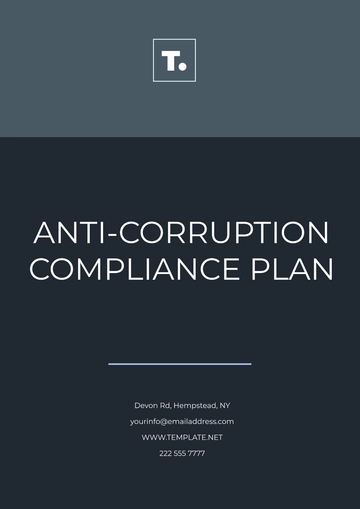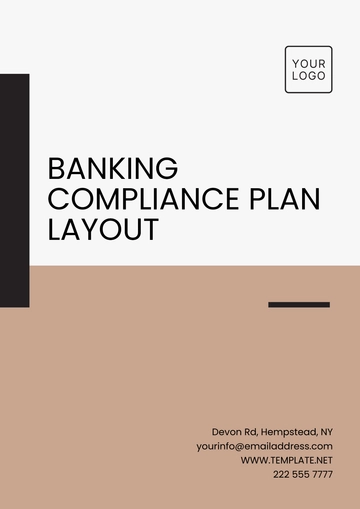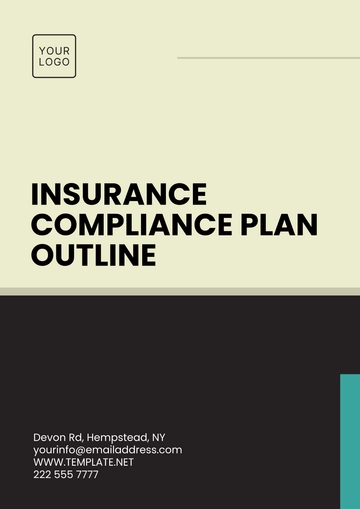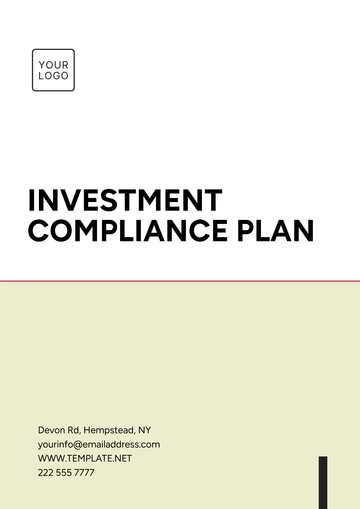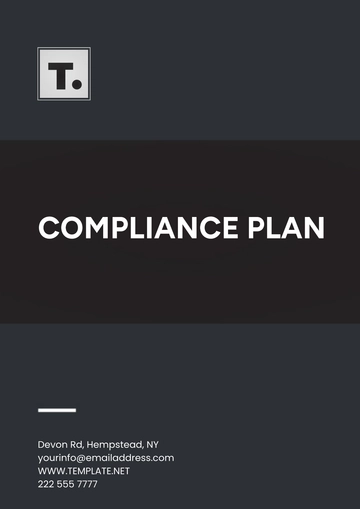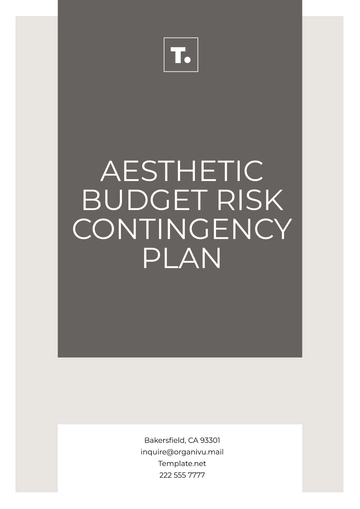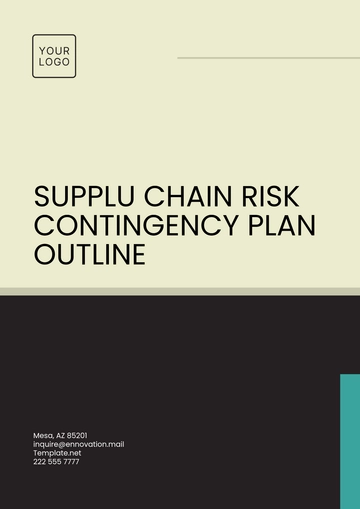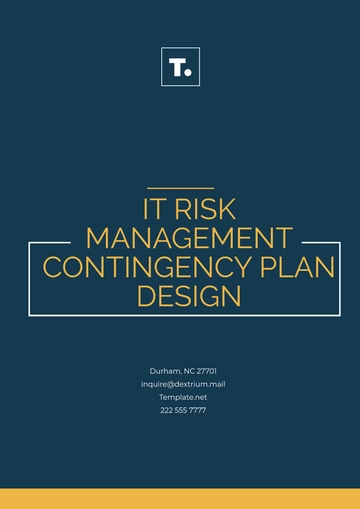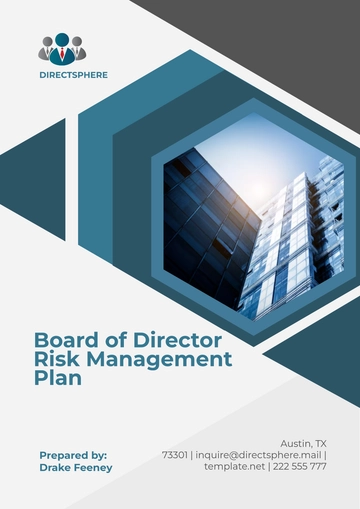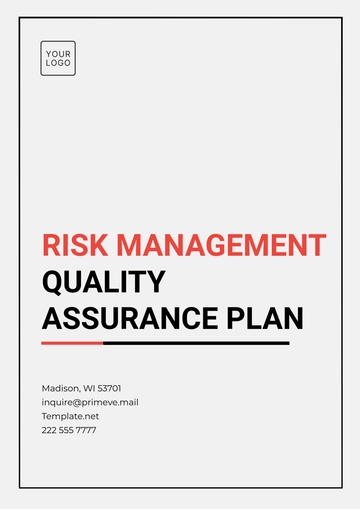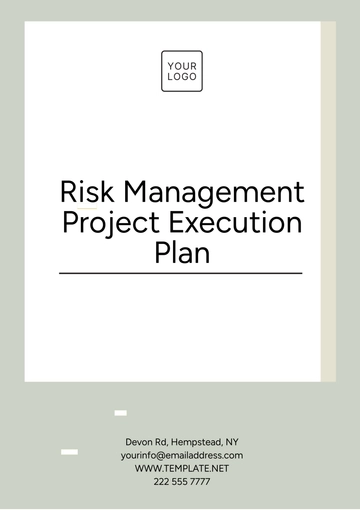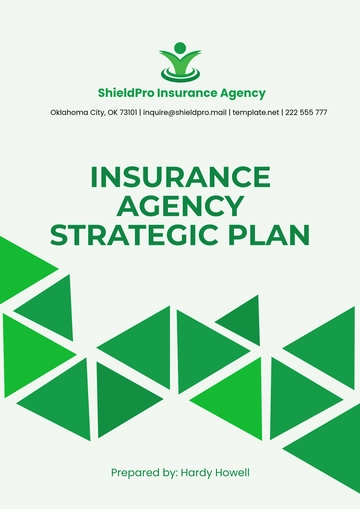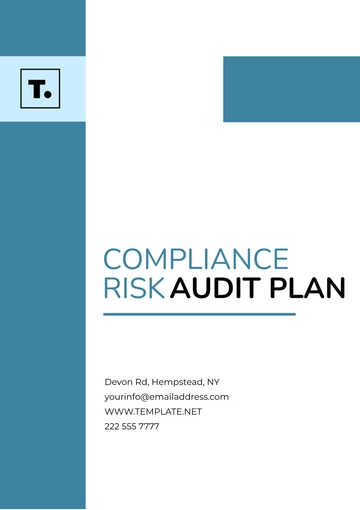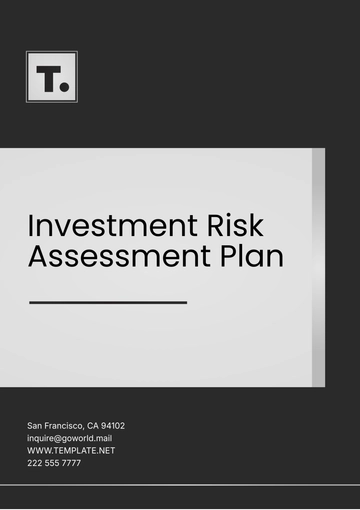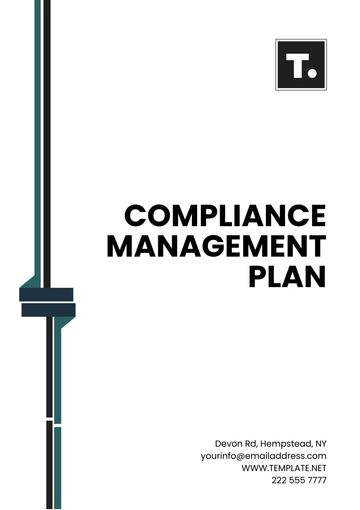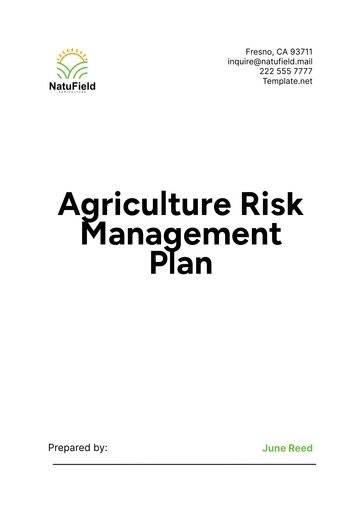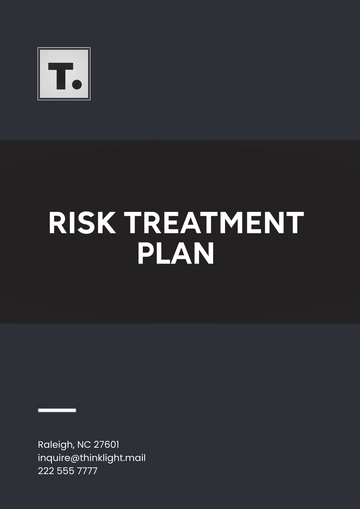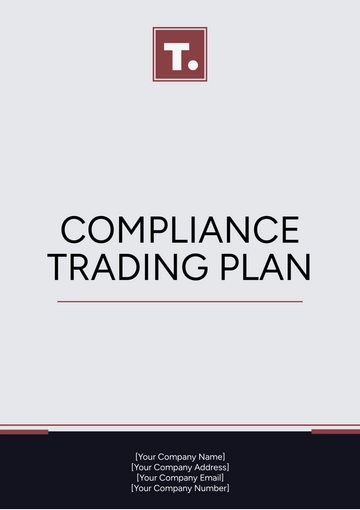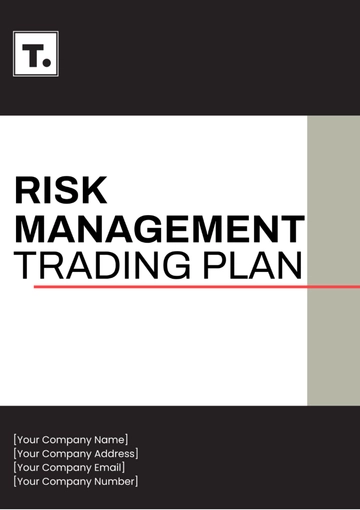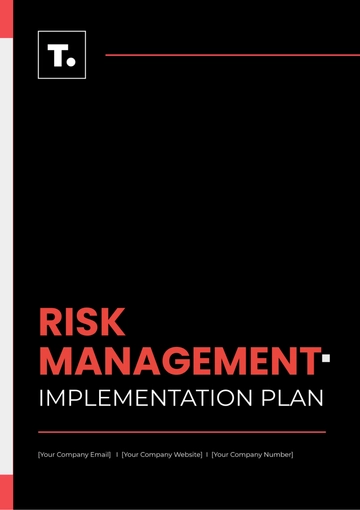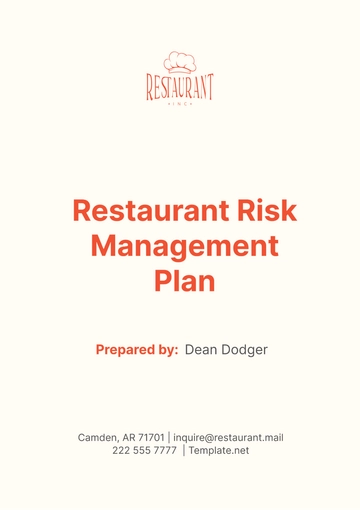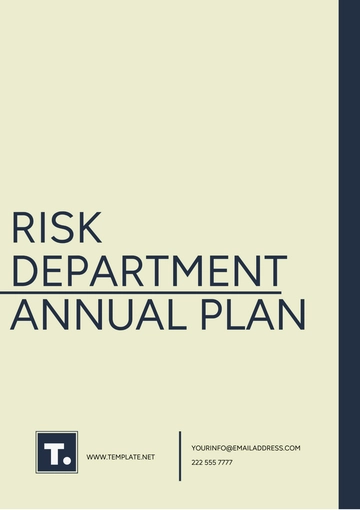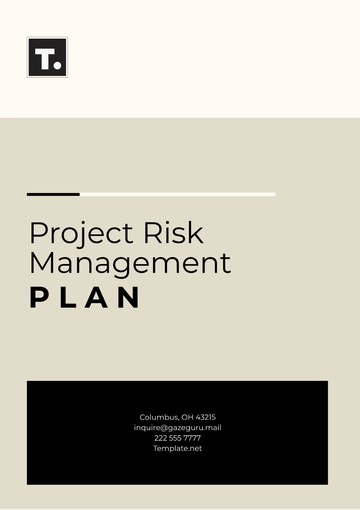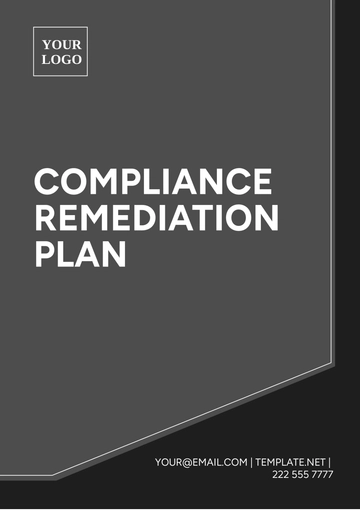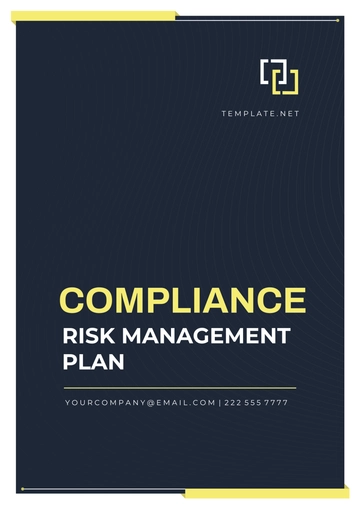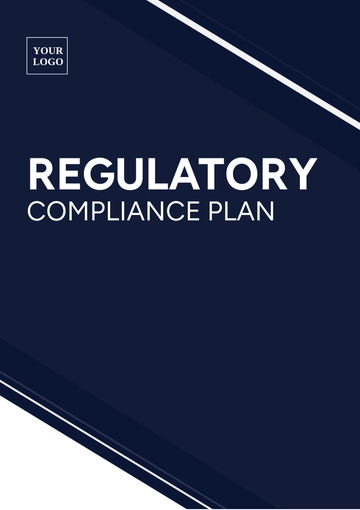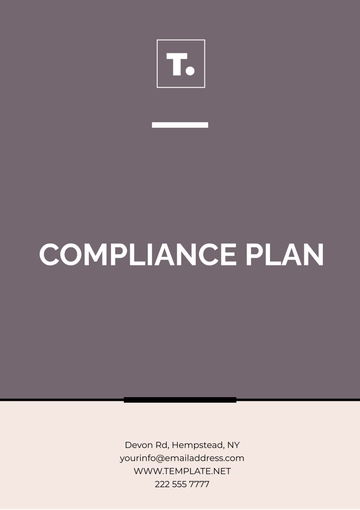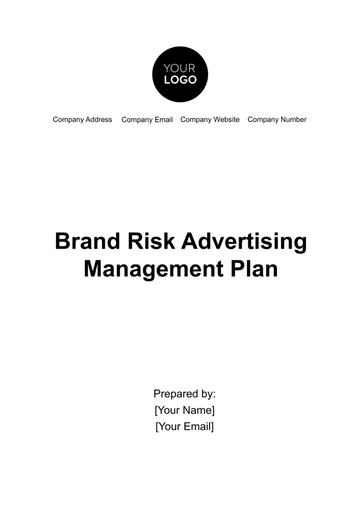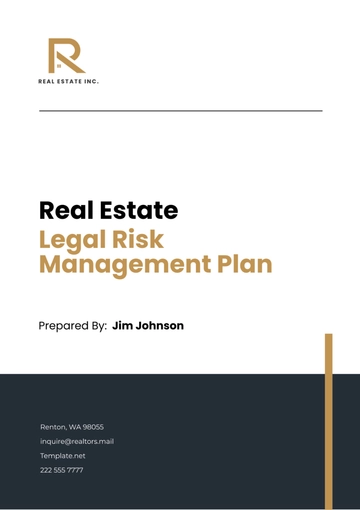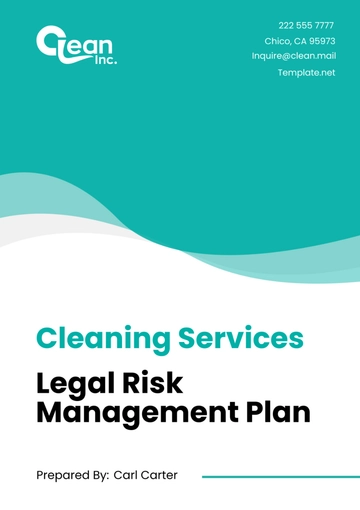Free Restaurant Risk Management Plan
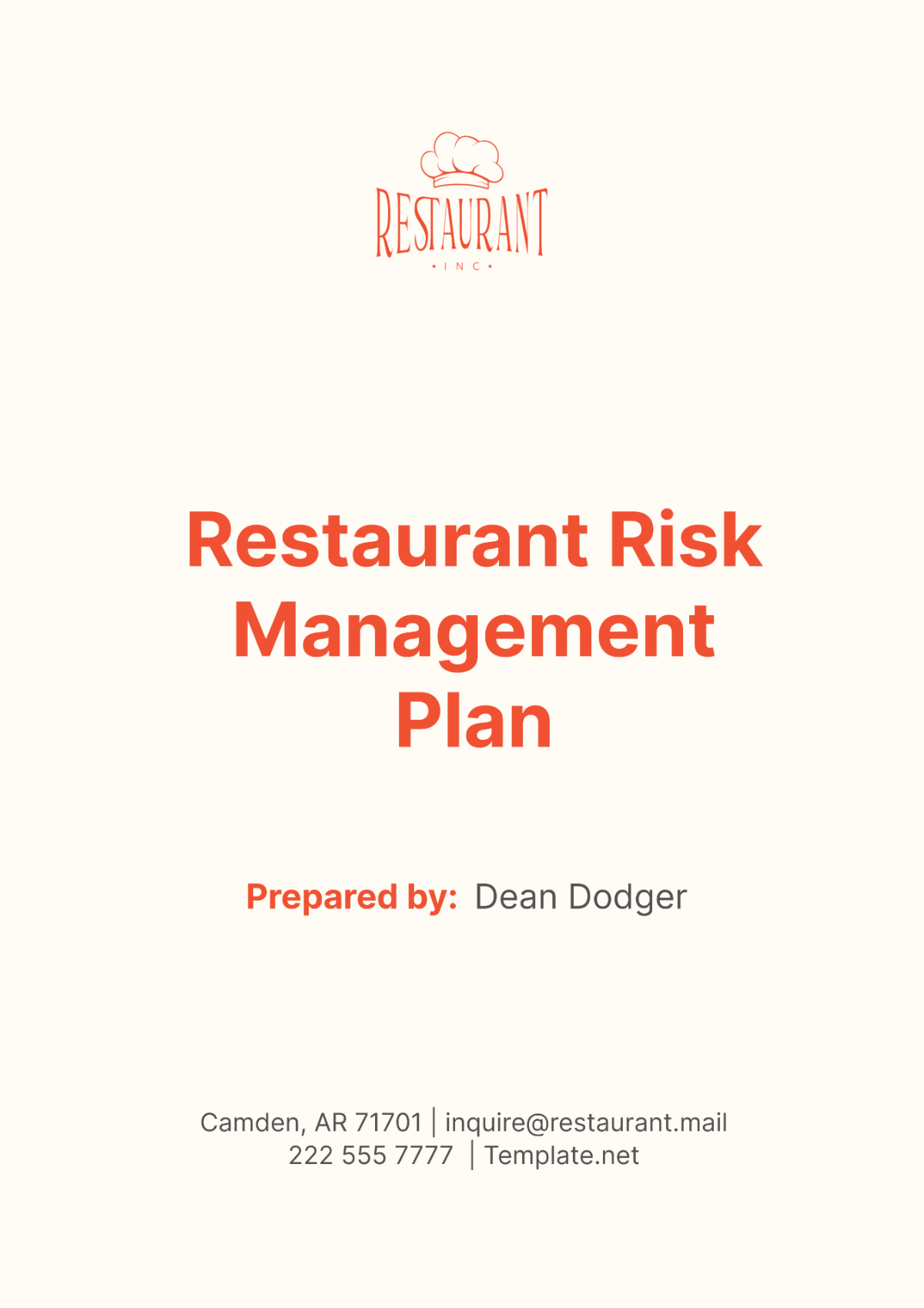
I. Introduction and Objectives
This Risk Management Plan is designed to systematically identify, assess, and mitigate risks associated with the operation of [Your Company Name]. Our commitment is to ensure the safety and well-being of our customers and staff, uphold a high standard of service, and protect the financial stability of the restaurant.
Objectives include:
Identify potential risks
Analyze the likelihood and impact of these risks
Develop strategies to mitigate identified risks
Establish a monitoring and evaluation system
II. Scope
This Risk Management Plan encompasses all facets of operations within [Your Company Name], ensuring a comprehensive approach to risk management. It covers every aspect of food preparation, from sourcing ingredients to cooking and serving dishes, to guarantee the highest standards of food safety and hygiene. Additionally, the plan addresses customer service protocols to mitigate risks related to customer interactions, ensuring that staff are trained to handle various scenarios effectively and courteously.
Furthermore, the plan extends to supply chain management, recognizing the importance of reliable suppliers and consistent quality control. Financial operations are also a critical component, with measures to protect against financial risks such as fraud, theft, and economic fluctuations. By applying this plan across all areas of operation, we aim to create a safe, secure, and efficient environment for our customers and staff while safeguarding the restaurant's reputation and financial health.
III. Responsibilities
The Risk Management Team at [Your Company Name] comprises key personnel from various departments to ensure a holistic approach to identifying, assessing, and mitigating risks. Each member brings specialized expertise, contributing to the comprehensive management of potential risks within the restaurant's operations. The table below outlines the team members and their specific responsibilities in the risk management process.
Team Member | Role |
|---|---|
Restaurant Manager | Overall risk management, including policy development and implementation |
Head Chef | Focuses on risks related to food safety and kitchen operations |
Finance Manager | Handles financial risks and ensures budget adherence |
Human Resources Manager | Addresses risks tied to staff management and training |
IT Specialist | Manages risks associated with technology and data security |
IV. Timeline
Establishing a clear timeline is crucial for the effective implementation of the Risk Management Plan at [Your Company Name]. This timeline outlines key milestones, ensuring that each phase of risk management is completed in a structured and timely manner. From the initial risk assessment to the ongoing monitoring and evaluation, each step is critical to maintaining a safe and secure environment for our customers and staff.
Milestone | Target Date |
|---|---|
Risk Assessment | [Month, Day, Year] |
Development of Mitigation Strategies | [Month, Day, Year] |
Implementation of Risk Management Plan | [Month, Day, Year] |
Monitoring and Evaluation | Ongoing |
V. Resource Allocation
Effective resource allocation is essential for the successful implementation of the Risk Management Plan at [Your Company Name]. Allocating the necessary budget, human resources, and technological tools ensures that all aspects of risk management are addressed efficiently. The table below details the specific resources required, facilitating a clear understanding of the investments needed to maintain a robust risk management system.
Resource | Description | Allocation |
|---|---|---|
Budget for Training and Development | Funds allocated for staff training programs and workshops | $[0] annually |
Human Resources for Risk Management Team | Personnel dedicated to risk management activities | 5 team members |
Technological Tools | Software and hardware for risk assessment and monitoring | $[0] initial setup, $[0] annual maintenance |
VI. Communication Plan
Effective communication is vital for the successful implementation of the Risk Management Plan. The communication strategy includes:
Regular meetings of the Risk Management Team
Quarterly risk assessment updates to the staff
Emergency communication protocol for immediate risk issues
Key points of contact:
Email: [Your Company Email]
Phone: [Your Company Number]
Address: [Your Company Address]
VII. Risk Management
Managing risks effectively is critical to the smooth operation of [Your Company Name].
The primary risks associated with the restaurant operations include:
Food Safety Risks
Financial Risks
Operational Risks
Legal and Compliance Risks
A. Mitigation strategies
1. Food Safety Risks
Food safety is paramount to our operations. To mitigate these risks, we will implement the following strategies:
Regular staff training on food safety protocols
Routine inspections and audits
Strict adherence to health regulations
2. Financial Risks
Financial stability is essential for our success. The following strategies will help manage financial risks:
Monthly financial reviews and audits
Implementation of budget controls
3. Operational Risks
Operational efficiency is vital for daily activities. To address operational risks, we will:
Regular maintenance of kitchen equipment
Daily operational checklists
4. Legal and Compliance Risks
Adhering to laws and regulations is crucial. The following strategies ensure compliance:
Ensure compliance with local, state, and federal laws
Regular legal consultations
VIII. Quality Assurance/Control
Maintaining high standards of quality is essential for the reputation and success of [Your Company Name]. Implementing rigorous Quality Assurance (QA) and Quality Control (QC) measures ensures consistent service excellence and customer satisfaction. These measures include continuous staff training, regular quality assessments, and effective customer feedback mechanisms. By adhering to these practices, we aim to uphold the highest standards in every aspect of our operations.
Regular staff training programs
Monthly quality assessments
Customer feedback mechanisms
IX. Monitoring and Evaluation
To ensure the ongoing effectiveness of the Risk Management Plan at [Your Company Name], we will implement a robust monitoring and evaluation system. This comprehensive approach will allow us to continuously assess the effectiveness of our risk management strategies and make necessary adjustments to address emerging risks. Regular reviews and performance tracking will be integral to maintaining a proactive stance in risk management, ensuring that all potential threats are managed effectively.
Key components of our monitoring and evaluation system include:
Quarterly Risk Assessment Reviews
We will conduct thorough risk assessment reviews every quarter. These reviews will involve analyzing existing risks, identifying new risks, and evaluating the effectiveness of current mitigation strategies. This regular assessment ensures that our risk management efforts remain relevant and responsive to any changes in the operational environment.
Key Performance Indicators (KPIs) Tracking
Tracking KPIs related to risk management will provide measurable insights into our performance. These indicators might include the number of incidents reported, compliance rates, financial stability metrics, and customer satisfaction scores. Regularly monitoring these KPIs will help us gauge the success of our risk management strategies and identify areas for improvement.
Annual Comprehensive Risk Audit
An annual comprehensive risk audit will be conducted to evaluate the overall effectiveness of the Risk Management Plan. This audit will involve an in-depth review of all risk management activities, policies, and outcomes. The findings from this audit will inform any necessary revisions to the plan, ensuring it remains robust and effective in managing risks across all areas of the restaurant's operations.
X. Stakeholder Engagement and Flexibility
Active engagement with stakeholders, including employees, customers, suppliers, and regulatory bodies, is essential. The plan should remain flexible to adapt to new risks and changing circumstances.
For more information, please visit [Your Company Website] or follow us on social media at [Your Company Social Media].
- 100% Customizable, free editor
- Access 1 Million+ Templates, photo’s & graphics
- Download or share as a template
- Click and replace photos, graphics, text, backgrounds
- Resize, crop, AI write & more
- Access advanced editor
Explore Template.net's Restaurant Risk Management Plan Template – your essential tool for identifying and mitigating risks in the food service industry. This editable and customizable template ensures clarity and thoroughness in risk management planning. Tailored for precision, it's editable in our Ai Editor Tool, offering seamless customization. Safeguard your restaurant's operations with a comprehensive risk management plan that addresses potential hazards, contingency strategies, and preventive measures to ensure business continuity and safety.
You may also like
- Finance Plan
- Construction Plan
- Sales Plan
- Development Plan
- Career Plan
- Budget Plan
- HR Plan
- Education Plan
- Transition Plan
- Work Plan
- Training Plan
- Communication Plan
- Operation Plan
- Health And Safety Plan
- Strategy Plan
- Professional Development Plan
- Advertising Plan
- Risk Management Plan
- Restaurant Plan
- School Plan
- Nursing Home Patient Care Plan
- Nursing Care Plan
- Plan Event
- Startup Plan
- Social Media Plan
- Staffing Plan
- Annual Plan
- Content Plan
- Payment Plan
- Implementation Plan
- Hotel Plan
- Workout Plan
- Accounting Plan
- Campaign Plan
- Essay Plan
- 30 60 90 Day Plan
- Research Plan
- Recruitment Plan
- 90 Day Plan
- Quarterly Plan
- Emergency Plan
- 5 Year Plan
- Gym Plan
- Personal Plan
- IT and Software Plan
- Treatment Plan
- Real Estate Plan
- Law Firm Plan
- Healthcare Plan
- Improvement Plan
- Media Plan
- 5 Year Business Plan
- Learning Plan
- Marketing Campaign Plan
- Travel Agency Plan
- Cleaning Services Plan
- Interior Design Plan
- Performance Plan
- PR Plan
- Birth Plan
- Life Plan
- SEO Plan
- Disaster Recovery Plan
- Continuity Plan
- Launch Plan
- Legal Plan
- Behavior Plan
- Performance Improvement Plan
- Salon Plan
- Security Plan
- Security Management Plan
- Employee Development Plan
- Quality Plan
- Service Improvement Plan
- Growth Plan
- Incident Response Plan
- Basketball Plan
- Emergency Action Plan
- Product Launch Plan
- Spa Plan
- Employee Training Plan
- Data Analysis Plan
- Employee Action Plan
- Territory Plan
- Audit Plan
- Classroom Plan
- Activity Plan
- Parenting Plan
- Care Plan
- Project Execution Plan
- Exercise Plan
- Internship Plan
- Software Development Plan
- Continuous Improvement Plan
- Leave Plan
- 90 Day Sales Plan
- Advertising Agency Plan
- Employee Transition Plan
- Smart Action Plan
- Workplace Safety Plan
- Behavior Change Plan
- Contingency Plan
- Continuity of Operations Plan
- Health Plan
- Quality Control Plan
- Self Plan
- Sports Development Plan
- Change Management Plan
- Ecommerce Plan
- Personal Financial Plan
- Process Improvement Plan
- 30-60-90 Day Sales Plan
- Crisis Management Plan
- Engagement Plan
- Execution Plan
- Pandemic Plan
- Quality Assurance Plan
- Service Continuity Plan
- Agile Project Plan
- Fundraising Plan
- Job Transition Plan
- Asset Maintenance Plan
- Maintenance Plan
- Software Test Plan
- Staff Training and Development Plan
- 3 Year Plan
- Brand Activation Plan
- Release Plan
- Resource Plan
- Risk Mitigation Plan
- Teacher Plan
- 30 60 90 Day Plan for New Manager
- Food Safety Plan
- Food Truck Plan
- Hiring Plan
- Quality Management Plan
- Wellness Plan
- Behavior Intervention Plan
- Bonus Plan
- Investment Plan
- Maternity Leave Plan
- Pandemic Response Plan
- Succession Planning
- Coaching Plan
- Configuration Management Plan
- Remote Work Plan
- Self Care Plan
- Teaching Plan
- 100-Day Plan
- HACCP Plan
- Student Plan
- Sustainability Plan
- 30 60 90 Day Plan for Interview
- Access Plan
- Site Specific Safety Plan
